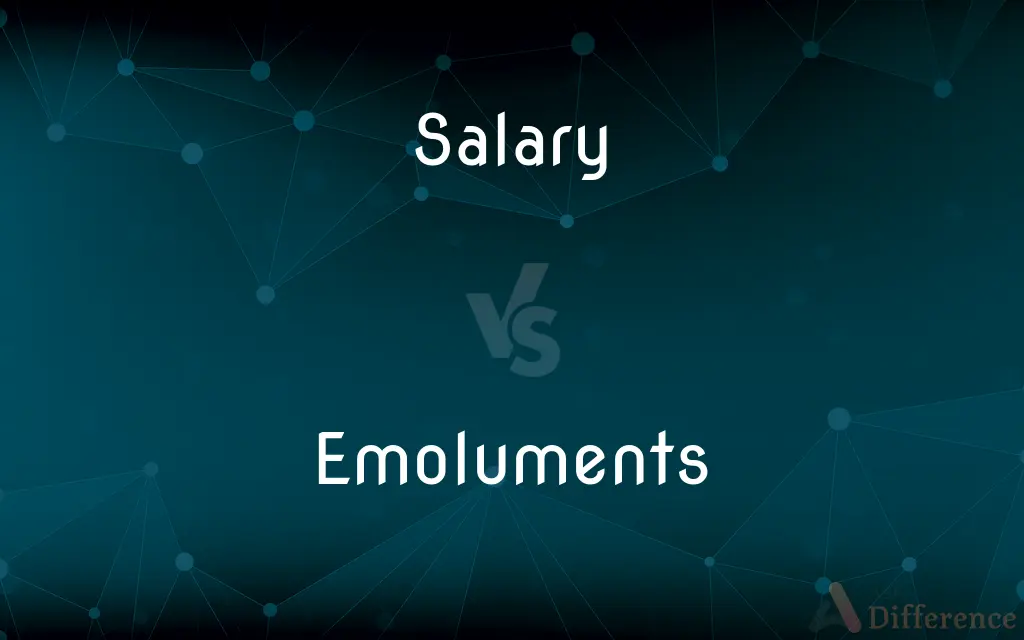Salary vs. Emoluments — What's the Difference?
Edited by Tayyaba Rehman — By Fiza Rafique — Published on November 9, 2023
Salary refers to a fixed regular payment for work, while emoluments encompass the total benefits received from employment, including salary, perks, and allowances. Both relate to compensation.

Difference Between Salary and Emoluments
Table of Contents
ADVERTISEMENT
Key Differences
Salary is a specific term that refers to a fixed regular payment, typically paid on a monthly or biweekly basis, made by an employer to an employee. It's especially associated with non-hourly employment, where the amount is predetermined and doesn't fluctuate based on hours worked. Emoluments, on the other hand, offer a broader scope, covering the entirety of the compensation package an employee receives. This can include salary, but also perks, bonuses, allowances, and other benefits.
A salary often serves as the foundation of an employee's income. It's predictable and consistent, allowing for easier financial planning. Emoluments represent the wider picture of what an employee gains from their job, taking into account not just the basic pay, but additional compensations too.
When discussing compensation in contracts or formal documents, the term "salary" might be used to denote the fixed pay, while "emoluments" could be used to detail the whole compensation package. For instance, a high-ranking executive might have a base salary, but their emoluments could encompass stock options, bonuses, and other perks.
While the term salary is commonly used in everyday conversations and is well understood by most, emoluments might be less familiar to some. Emoluments, being a more encompassing term, captures the full spectrum of financial and non-financial benefits an employee can receive.
Comparison Chart
Definition
Fixed regular payment for work.
Total benefits received from employment.
ADVERTISEMENT
Includes
Predetermined amount of money.
Salary, perks, bonuses, allowances.
Frequency
Typically monthly or biweekly.
Varies based on components.
Usage
Common in everyday language.
More formal, used in contracts/documents.
Dependence on work hours
Usually not dependent for salaried positions.
Encompasses elements both dependent and independent.
Compare with Definitions
Salary
A regular payment from an employer to an employee.
Her monthly salary helps her manage her expenses efficiently.
Emoluments
All forms of compensation or profits earned from a job or office.
In addition to his basic pay, his emoluments comprised various allowances.
Salary
Wages given to an employee, not necessarily based on hours worked.
She was looking for a job with a better salary and benefits.
Emoluments
Benefits received in return for professional services.
The position offers various emoluments, making it attractive to potential candidates.
Salary
A fixed amount paid at regular intervals.
He preferred a job with a stable salary over hourly wages.
Emoluments
The total compensation package received by an employee.
The CEO's emoluments include bonuses, stock options, and other benefits.
Salary
Compensation received primarily for an individual's labor or services.
After his promotion, his salary saw a significant increase.
Emoluments
Comprehensive earnings and benefits from a position.
The total emoluments for the job made it one of the best offers he had.
Salary
Money paid to employees in exchange for a set amount of work.
The salary package offered by the company was competitive.
Emoluments
Monetary and non-monetary rewards from employment.
Besides a good salary, the emoluments of the role are quite appealing.
Salary
Fixed compensation for services, paid to a person on a regular basis.
Emoluments
Payment for an office or employment; compensation.
Salary
A fixed amount of money paid to a worker, usually calculated on a monthly or annual basis, not hourly, as wages. Implies a degree of professionalism and/or autonomy.
Emoluments
Inflection of emolument
Salary
To pay on the basis of a period of a week or longer, especially to convert from another form of compensation.
Salary
(obsolete) Saline.
Salary
Saline
Salary
The recompense or consideration paid, or stipulated to be paid, to a person at regular intervals for services; fixed wages, as by the year, quarter, or month; stipend; hire.
This is hire and salary, not revenge.
Salary
To pay, or agree to pay, a salary to; to attach salary to; as, to salary a clerk; to salary a position.
Salary
Something that remunerates;
Wages were paid by check
He wasted his pay on drink
They saved a quarter of all their earnings
Common Curiosities
Is it accurate to say all salaries are emoluments but not all emoluments are salaries?
Yes, that's accurate.
Are perks like health insurance considered emoluments?
Yes, such perks are part of the total emoluments.
How frequently is salary usually paid?
Salary is typically paid monthly or biweekly, depending on the employer's policy.
Which term is broader, salary or emoluments?
Emoluments is broader, encompassing the entire compensation package, while salary refers specifically to regular fixed payments.
Are bonuses part of a salary?
Bonuses aren't typically part of the base salary; they're additional incentives. However, they can be part of emoluments.
Can hourly wages be considered a salary?
Typically, "salary" refers to fixed regular payments, whereas hourly wages are based on hours worked.
Are allowances considered part of the salary?
Allowances can be additional to the basic salary, but together, they form part of the emoluments.
Can emoluments change even if the salary remains constant?
Yes, the other components of emoluments like bonuses, benefits, or perks can change independently of the base salary.
Is the term "emoluments" commonly used?
While "salary" is commonly understood, "emoluments" is a more formal term, often used in contracts or official documents.
Is it possible for two people with the same salary to have different emoluments?
Yes, depending on the additional benefits or bonuses they receive.
Which term is more inclusive of overall compensation?
Emoluments is more inclusive, covering all forms of compensation and benefits.
Can emoluments include non-monetary benefits?
Yes, emoluments can include both monetary and non-monetary benefits.
Are stock options considered part of emoluments?
Yes, stock options can be considered a part of an individual's emoluments.
Do all jobs offer emoluments beyond a basic salary?
Not necessarily. Some jobs might only offer a basic salary without additional perks or benefits.
Is a commission-based payment a salary?
Commission-based payment isn't typically considered a fixed salary; it varies based on performance or sales.
Share Your Discovery

Previous Comparison
Had Done vs. Have Done
Next Comparison
Shirt vs. T-ShirtAuthor Spotlight
Written by
Fiza RafiqueFiza Rafique is a skilled content writer at AskDifference.com, where she meticulously refines and enhances written pieces. Drawing from her vast editorial expertise, Fiza ensures clarity, accuracy, and precision in every article. Passionate about language, she continually seeks to elevate the quality of content for readers worldwide.
Edited by
Tayyaba RehmanTayyaba Rehman is a distinguished writer, currently serving as a primary contributor to askdifference.com. As a researcher in semantics and etymology, Tayyaba's passion for the complexity of languages and their distinctions has found a perfect home on the platform. Tayyaba delves into the intricacies of language, distinguishing between commonly confused words and phrases, thereby providing clarity for readers worldwide.













































